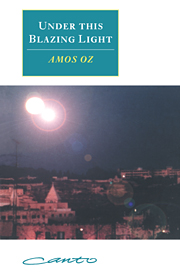Book contents
- Frontmatter
- Contents
- Translator's note
- Preface to the Hebrew edition
- Introduction
- Events and books
- Under this blazing light
- ‘Man is the sum total of all the sin and fire pent up in his bones’
- ‘A ridiculous miracle hanging over our heads’
- The State as reprisal
- A modest attempt to set out a theory
- The meaning of homeland
- The discreet charm of Zionism
- A.D. Gordon today
- Thoughts on the kibbutz
- The kibbutz at the present time
- How to be a socialist
- Munia Mandel's secret language
- Pinchas Lavon
- The lost garden
- An autobiographical note
- An alien city
- Like a gangster on the night of the long knives, but somewhat in a dream
- Notes
- Publication history
- Index of names
The lost garden
Published online by Cambridge University Press: 07 September 2010
- Frontmatter
- Contents
- Translator's note
- Preface to the Hebrew edition
- Introduction
- Events and books
- Under this blazing light
- ‘Man is the sum total of all the sin and fire pent up in his bones’
- ‘A ridiculous miracle hanging over our heads’
- The State as reprisal
- A modest attempt to set out a theory
- The meaning of homeland
- The discreet charm of Zionism
- A.D. Gordon today
- Thoughts on the kibbutz
- The kibbutz at the present time
- How to be a socialist
- Munia Mandel's secret language
- Pinchas Lavon
- The lost garden
- An autobiographical note
- An alien city
- Like a gangster on the night of the long knives, but somewhat in a dream
- Notes
- Publication history
- Index of names
Summary
The first films I ever saw were Tarzan films. There wasn't a single Tarzan film shown in Jerusalem that we, the gang and I, missed. We saw them all. It was when we were seven, eight, nine. … There were Flash Gordon films too, and others, all of them presenting a neat, orderly world.
I look back nostalgically on those films, on that world: it was always a simple compound of morality, beauty and strength. It is a lost paradise. Who is there who has never yearned for a simple, symmetrical world, in which the good guy is always better-looking, braver and cleverer (but not by much) than the bad guy, and where he always gets the beautiful girl in the end? All those Tarzan and Flash Gordon films were idealistic to the highest degree. To this day they still remind me of the fascinations of a neat, orderly world. By the time I had seen my third or fourth Flash Gordon I knew what one could look forward to: disorder would eventually join forces with order, and accept its rule. It was a symmetrical world, with rewards and punishments, and a reason and justification for all pain and suffering. Sometimes I could guess right at the start of a film at what point the forces of evil would erupt … but even the sudden, unexpected explosions of evil were amazingly well integrated into what was expected and right. We knew that Tarzan would be captured by the savages. We knew that they would overpower him and tie him up and his situation would be desperate, with no hope of escape.
- Type
- Chapter
- Information
- Under this Blazing Light , pp. 153 - 164Publisher: Cambridge University PressPrint publication year: 1995
- 1
- Cited by

